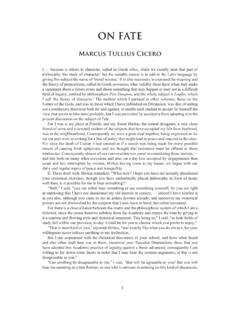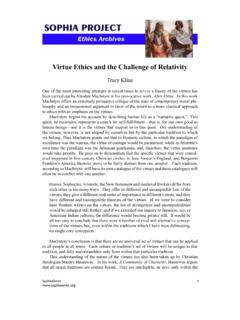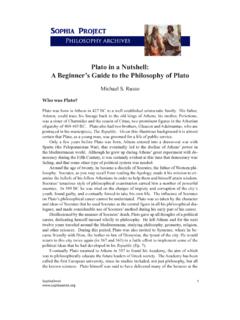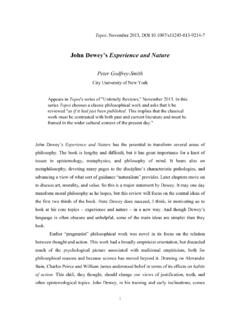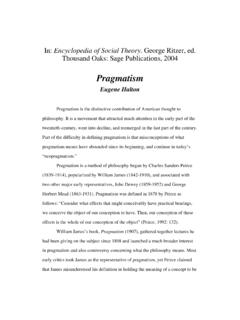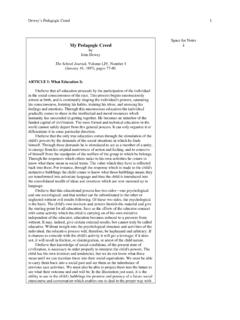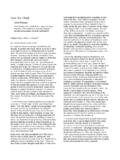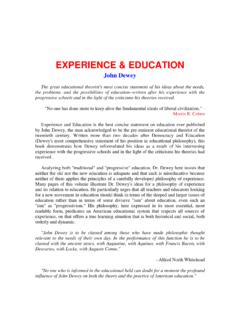Transcription of Dewey’s Version of Pragmatism - Sophia Project
1 dewey 's Version of Pragmatism Michael J. Quirk dewey 's brand of Pragmatism , which he called instrumentalism , needs to be distin- guished from the Pragmatism of Charles Sanders Peirce and William James, as well as the instrumentalism of the Logical Positivists. Peirce is generally considered the first prag- matist-instrumentalist because of his advocacy of the operational criterion of meaning . Operationalism, also known as verificationism , is the idea that meaning is not an entity which exists in some Platonic heaven , waiting to be apprehended by knowing subjects, but a part of the process of inquiry itself: a concept or a sentence means something only insofar as it can be verified by the procedures or operations of human inquiry. Peirce is a pragmatist insofar as meanings arise from human activity (in Greek, praxis), and dewey borrowed generously from Peirce in this regard.
2 But unlike dewey , Peirce was a self-de- scribed scholastic realist and a metaphysician. There is a reality-in-itself which has a definite character independent of what any individual thinks about it (although not inde- pendent of thought-in-general ), that knowers apprehend in the act of knowing, and their knowledge of this reality-in-itself becomes more and more adequate as human knowledge evolves in sync with reality. dewey would reject Peirce's unique brand of realistic meta- physics indeed all metaphysics as still ensnared by the spectator theory of knowl- edge , and hence inadequately pragmatic. James, unlike Peirce, was less concerned with metaphysical speculation about the ul- timate nature of reality than with the real-life problems and difficulties of ordinary human beings , with questions like Does my life have any meaning?
3 , Does God exist? , and so on (Some scholars have suggested that in this respect, James is almost an exis- tentialist a la Sartre and Camus). And he wrote for a general rather than a professional . philosophical audience, filling the same role as edifying pop-psychologists do today (al- though, I might add, on an infinitely higher level of discussion and with much more rigor and integrity). This was not exactly dewey 's aim. He wished to enlist James's pragmatic, engaged philosophic reflection in the service of participatory democracy and the solu- tion of social problems. Whereas James was an individualist in his philosophical interests, dewey was more communitarian. Instrumentalism The Logical Positivists, were, like dewey , fierce partisans of the scientific method , and also adherents of operationalism and verificationism.
4 Yet, for the positivists, ver- ification was a relatively simple procedure: one simply made controlled observations of the world we experience ( , experimentation), took stock of the sense data which are SophiaOmni . given in these observations, and determined whether these data confirm or disconfirm the hypotheses one was testing. dewey 's verificationism is entirely different. It construes verification not as a passive looking-at the sensibilia given in experience in fact, he rejects all this as another example of the hold of spectator theories of knowledge . Rather, verification is an integral part of the process in which human agents interact and cope with problems that are thrown up by their environment practical, rather than theo- retical problems. Intelligence The practical, engaged conception of intelligence that is the pivot-point of dewey 's philosophy comes through in his psychological writings.
5 Compare dewey 's psychology of impulse/habit/intelligence with the stimulus/response schema of behaviorists and the id/ego/superego triumvirate of Freud. Unlike the behaviorists, dewey did not understand human action as resting on unmediated reflexes: human interaction with the environment can be intelligent interaction, in which the the environment is seen as posing a problem about which the agent can get clear, and adjust both her means and ends to the demands of the situation. Intelligence cannot be reduced to unintelligent, mechanical S/R reflexes. And like Freud, dewey admitted the omnipresence of impulse , but he denied that it was best understood as an alien force (the id , literally translated out of Latin, means the IT -- the not-me) to be tamed and subjugated by the ego. dewey 's problem-solving, situated psy- chology makes impulse much more malleable to the aims of the ego (note dewey 's influ- ence on the later school of ego-psychologists ).
6 Sublimation is a much more workable psychic strategy for dewey . Both behaviorism and Freudian psychoanalysis mistakenly depict human beings as machines reacting to stimuli or blind impulse, rather than beings organically interacting with their environment, intelligently assessing their situation and coping with it. Above all: notice how dewey 's psychological theses set the stage for the way in which he alters the presuppositions of traditional philosophy. For dewey , humans are first and foremost problem solving animals: it is only because we continually find ourselves thrust into situations that are both precarious and stable , which pose a challenge to us as agents, that we can take stock of facts, formulate theories, experimentally test them, and so on. It is not the case that first we know what is the case, and then use than knowledge to help us act: our knowledge derives from our doing things.
7 Education, Social Science, and Democracy While non-intelligent habit is not necessarily bad, it's not necessarily good either, and we cannot determine whether it is or not until we've subjected our habitual modes of action to the test of critical intelligence. Hence dewey 's progressive educational theory which stresses training the child in rational methods of inquiry as well as factual content. dewey never takes educational content to be irrelevant to forming an educated person: rather, merely being able to list facts , without being able to intelligently measure their signifi- cance, or to critically establish them, is to fall back on non-intelligent habit. Intelligence is an organic capacity which helps us cope with our natural and social environment. Hence dewey , like Comte and the utilitarians, favored the use of Social SophiaOmni.
8 Science to help the public deal with the challenges of living in a modern, technologically mediated world. He did not see Social Science as a means in which the masses could be induced to adapt to the status quo, as in Skinner's Walden Two: coping more often than not involves radically changing the existing socio-political order, as as opposed to changing ourselves to fit in . In this respect, dewey was close to Marx. His idea of social science differed from that of Marx, Comte, and the utilitarians in a number of respects, however. He did not think that the social sciences revealed the laws of human social be- havior, the way the laws of physics disclose the laws governing the behavior of physical objects, because human behavior is a dynamic, intelligent means of adapting to changing situations. Social science is thus less a body of lawlike generalizations than a set of flexible interpretations, subject to revision as the changing human situation demands it.
9 And un- like utilitarianism in particular, dewey did not believe that human nature or the good for human beings was either fixed or unproblematically given . Social science, for dewey , was essentially a critical enterprise, whereby we question reigning concepts of human nature or the good for human beings in light of critical intelligence. Philosophy, thus is the criticism of criticism what we do when we critically reflect on the findings of social (and natural science). Finally, dewey was an ardent champion of Democracy: education and social science derive their point from the way in which they serve a democratic community. dewey 's conception of democracy was participatory rather than procedural. Both present-day liber- als and conservatives are partisans of what dewey called old liberalism, insofar as they see democracy as a set of constraints which enable individuals to live as they prefer without state interference and without impinging upon the freedom of others to do likewise (pres- ent-day liberals and conservatives differ, primarily, on the degree to which governmental action is legitimate and necessary in enabling individuals to pursue their preferred mode- of-life).
10 While applauding old liberalism's accent on freeing the individual to pursue his or her own projects of self-realization , dewey questioned whether old liberalism was sufficiently aware of the intrinsically social way in which self-realization occurs. He won- dered whether, in being so adamantly individualistic, the old liberalism atomized society, and made intelligent inquiry into means and ends, an indispensible ingredient of self-real- ization, almost impossible to achieve. dewey 's new liberalism is more communitarian: by actively including as many individuals in public, political deliberation and action, we universalize the scientific method dewey was so fond of and thus make universal that freedom of mind which it promotes. dewey believed that the opposition between in- dividual and community which haunts modern political theory can be overcome if the individual sees himself or herself as a participant in the community, sharing in its common aims, criticizing and reformulating them as the changing situation demands it, and if this community is likewise devoted to the full development of each and every individual.
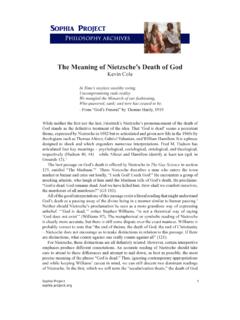
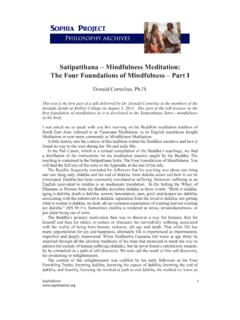
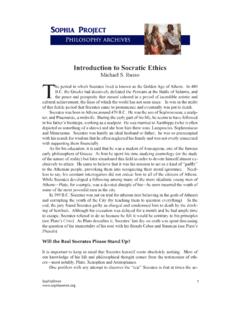
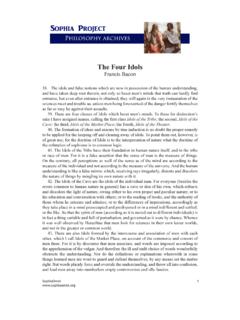
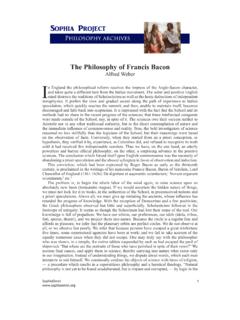
![Notes on Plato’s Gorgias [449c-466a] - Sophia Project](/cache/preview/0/5/3/c/e/1/d/7/thumb-053ce1d73ee53d8f939f1988e67d4864.jpg)
![Critique of Rhetoric [Gorgias 447a-461c] - Sophia Project](/cache/preview/9/f/9/b/c/2/9/8/thumb-9f9bc298ba899803867703925e030fa2.jpg)
